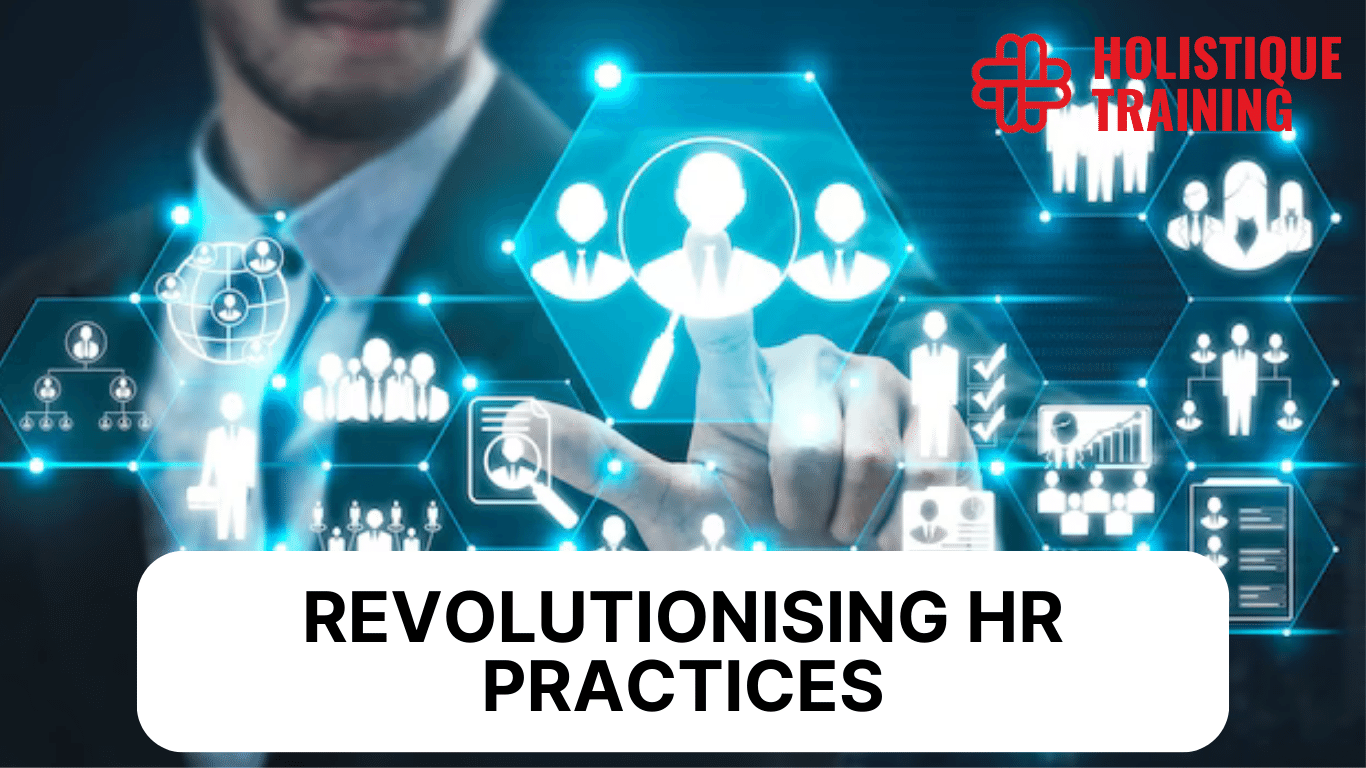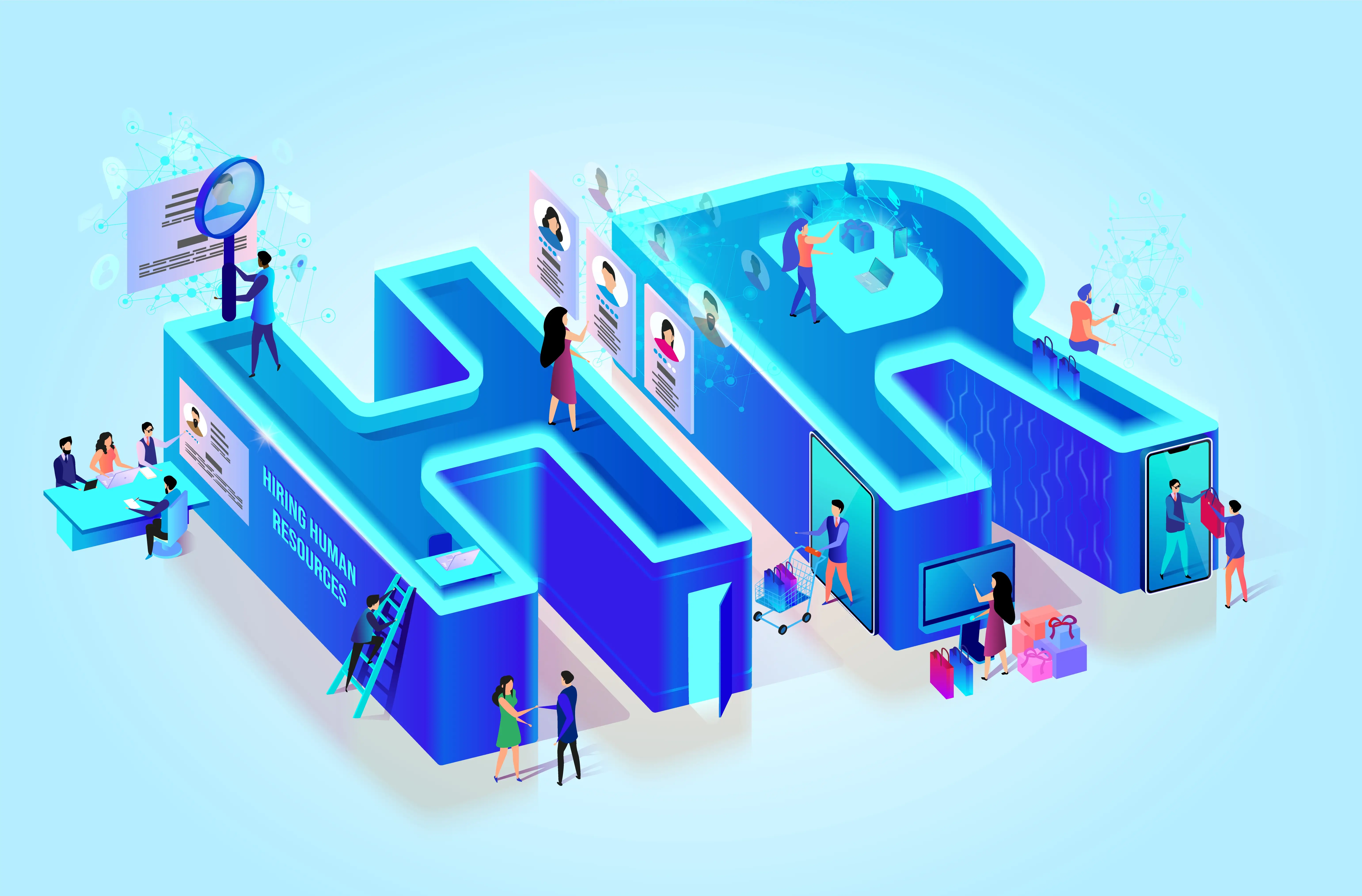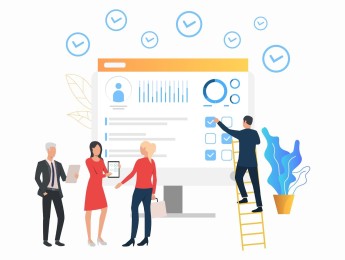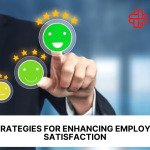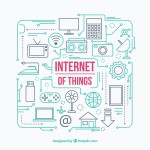The digital revolution has undeniably transformed the way we live, work, and conduct business. As organisations navigate the complexities of the modern era, one area that has experienced significant change is human resources (HR). The advent of digitalisation has ushered in a new era of HR practices, where traditional manual processes are being replaced by innovative digital solutions. In this blog post, we will explore the concept of digitalisation in HR and delve into its importance in driving HR transformation. Additionally, we will unravel the workings of digital HR and how it is reshaping the HR landscape for the better.
The Importance of HR Transformation
HR transformation, facilitated by digitalisation, has become a crucial strategic imperative for organisations worldwide. It involves reimagining and reinventing HR practices to align them with the digital age, thereby creating a positive impact on overall business performance. Let's delve into the key reasons why HR transformation is of utmost importance:
Enhanced Efficiency and Productivity
The primary goal of HR transformation is to streamline and optimise HR processes through digital solutions. This streamlining eliminates manual, time-consuming tasks, allowing HR professionals to redirect their efforts towards high-value activities. Talent acquisition, employee development, and strategic workforce planning become the focal points, resulting in a notable increase in efficiency and overall productivity within the HR function.
Improved Decision-Making
Digital HR introduces sophisticated data analytics and advanced reporting tools, providing HR professionals with actionable insights into workforce trends, employee performance, and engagement levels. The shift towards a data-driven approach empowers HR teams to make informed decisions. These decisions span areas such as talent management, succession planning, and performance evaluations, fostering a more strategic and effective HR strategy.
Enhanced Employee Experience
The adoption of digital HR tools translates into improved experiences for employees. Through seamless and user-friendly self-service portals, employees gain autonomy over their HR-related activities. From managing leave requests to participating in training and development programs, employees can navigate HR processes with ease. This empowerment contributes to a more positive and personalised employee experience, enhancing overall job satisfaction.
Table 1: Comparative analysis of traditional and digital HR
Task | Manual HR Tasks | Digital HR Tasks |
Talent Acquisition | Manual resume screening and shortlisting | Automated resume screening with AI and ML technologies |
Employee Development | Paper-based training materials | Accessible online training programmes through HCM systems |
Workforce Planning | Spreadsheet-based planning | Real-time data analytics for dynamic workforce planning |
Agility and Adaptability
In today's fast-paced business landscape, organisations must be agile and adaptable to thrive. Digital HR practices facilitate this agility by enabling swift responses to evolving business needs. Whether it's implementing remote work arrangements, accommodating flexible schedules, or streamlining virtual onboarding, digital HR ensures that organisations remain nimble. This adaptability not only meets the expectations of the modern workforce but positions organisations to attract and retain top talent in a highly competitive market.
Cost Savings
Beyond efficiency gains, HR transformation through digitalisation often results in significant cost savings. The automation of repetitive tasks, such as resume screening and onboarding processes, reduces the need for extensive manual labour. Moreover, the adoption of cloud-based HR solutions minimises infrastructure costs while ensuring scalability. These cost efficiencies contribute to the overall financial health of the organisation.
Compliance and Risk Management
Digital HR systems play a crucial role in ensuring compliance with ever-evolving labour laws and regulations. These systems can automate compliance checks, reducing the risk of human error in managing complex legal requirements. Additionally, centralised data storage and management enhance security, mitigating the risks associated with data breaches and confidentiality concerns.
Strategic Alignment with Business Goals
HR transformation aligns HR practices more closely with overarching business objectives. By leveraging digital tools for talent acquisition, performance management, and learning and development, HR becomes a strategic partner in achieving organisational goals. This alignment fosters a more cohesive and integrated approach to business success.
Cultural Transformation
Digital HR doesn't only transform processes; it contributes to a cultural shift within organisations. The emphasis on transparency, accessibility, and employee empowerment fosters a culture of openness and collaboration. This cultural transformation enhances teamwork, communication, and the overall employee experience, creating a workplace where innovation and creativity flourish.
In embracing HR transformation, organisations unlock a myriad of benefits that extend well beyond the HR department. The strategic integration of digital solutions not only addresses immediate operational challenges but also positions organisations for sustained success in the dynamic digital landscape. As the digital revolution continues, HR professionals must be proactive in exploring innovative solutions to maximise the potential of HR transformation and drive positive change throughout the organisation.
How Digital HR Works
Digital HR encompasses a range of technologies and tools that revolutionise HR processes and facilitate seamless interactions between HR professionals, employees, and management. Here are some key elements of digital HR:
Human Capital Management (HCM) Systems
At the heart of digital HR lies the integration of Human Capital Management (HCM) systems. These robust software platforms serve as the backbone, automating and centralising various HR processes. Talent acquisition, onboarding, performance management, learning and development, and employee engagement seamlessly converge within these systems. The integration of data from diverse HR functions provides HR professionals with a holistic view of the workforce, facilitating more informed decision-making.
Cloud-Based HR Solutions
The advent of cloud technology has revolutionised the accessibility and flexibility of HR operations. Cloud-based HR solutions empower organisations to access HR information and tools from any location, fostering collaboration among geographically dispersed teams. This accessibility ensures real-time updates and efficient communication, reducing the need for extensive on-premises IT infrastructure. Moreover, cloud solutions provide scalability and data security, addressing key concerns associated with traditional HR systems.
Employee Self-Service Portals
Digital HR transforms the employee experience through the implementation of self-service portals. These portals empower employees to independently manage a spectrum of HR-related tasks. From submitting time-off requests to accessing pay stubs and participating in training programs, employees gain autonomy over their HR interactions. This not only streamlines processes but also promotes transparency, efficiency, and a sense of ownership among the workforce.
Data Analytics and Reporting
The utilisation of data analytics tools is a cornerstone of digital HR. By leveraging these tools, HR professionals can extract meaningful insights from vast pools of employee data. Analysis of this data unveils patterns, trends, and correlations, laying the foundation for data-driven decision-making. Whether it's talent management, succession planning, or identifying areas for improvement, the insights derived from data analytics contribute to strategic HR planning and organisational success.
Artificial Intelligence (AI) and Machine Learning (ML)
AI and ML technologies are increasingly becoming integral components of digital HR practices. These technologies automate routine HR tasks, such as resume screening and candidate shortlisting, reducing manual effort and enhancing efficiency. AI-powered chatbots serve as virtual assistants, providing employees with instant access to HR information and support. The predictive capabilities of AI and ML also extend to areas like workforce planning and identifying potential high-performing employees, contributing to a more agile and proactive HR environment.
Globally, business and HR leaders are increasingly leveraging AI to support their workforce. According to data compiled by Statista, 58% of these leaders highlighted that the primary application of AI in their organisations is aimed at enhancing consistency and quality. Another significant 26% reported utilising AI to boost productivity among workers, while the remaining 16% employ AI to enhance insights within their operational framework.
Mobile Applications
The rise of mobile technology has led to the development of HR mobile applications. These applications extend HR functionalities to employees' smartphones, providing on-the-go access to HR services. From checking work schedules to receiving push notifications for important updates, mobile applications enhance the overall employee experience and cater to the demands of the modern, mobile workforce.
Integration of Social Media Platforms
Digital HR extends its reach by integrating with social media platforms. This integration facilitates talent acquisition by leveraging the vast networks available on platforms like LinkedIn. HR professionals can connect with potential candidates, showcase company culture, and promote employer branding. Social media integration also aids in employee engagement and collaboration, creating a dynamic and interconnected workplace culture.
In essence, how digital HR works is a convergence of technologies aimed at simplifying and enhancing HR processes. The integration of HCM systems, cloud solutions, self-service portals, data analytics, AI, and social media platforms creates a dynamic ecosystem that empowers HR professionals and enhances the overall employee experience. As organisations continue to embrace digitalisation, staying abreast of emerging technologies and evolving digital HR trends is essential for unlocking the full potential of these transformative tools.
Future Trends in Digital HR
The landscape of digital HR is continually evolving, driven by advancements in technology and the changing needs of the workforce. As we look ahead, several emerging trends are poised to shape the future of HR practices, bringing about transformative shifts in how organisations manage their human capital.
1- Virtual and Augmented Reality in HR Training
The future of HR training is undergoing a revolution with the integration of virtual and augmented reality (VR and AR). Organisations are exploring immersive experiences to enhance onboarding, skills training, and leadership development. Through VR simulations, employees can engage in realistic workplace scenarios, accelerating the learning process. AR, on the other hand, overlays digital information onto the real-world environment, providing interactive and dynamic training experiences. This trend not only improves the effectiveness of training programmes but also creates a more engaging and interactive learning environment, fostering better retention of information.
2- Blockchain for HR Security and Transparency
Blockchain technology is gaining prominence in HR for its potential to address security and transparency concerns. By leveraging blockchain, organisations can ensure the integrity of employee records and HR transactions. This tamper-resistant technology creates a secure and transparent system for managing sensitive HR data, including background checks and payroll information. The decentralised nature of blockchain enhances data security, reduces the risk of fraud, and instils trust in HR processes. As data privacy becomes an increasing concern, the adoption of blockchain in HR is expected to rise, establishing new standards for security and transparency.
3- Predictive Analytics for Talent Management
The integration of predictive analytics into digital HR practices is becoming a focal point for forward-thinking organisations. Predictive analytics utilises historical data and machine learning algorithms to forecast future trends, particularly in talent management. By analysing patterns and predicting potential outcomes, HR professionals can proactively address talent gaps, identify high-potential employees, and strategically plan for the future workforce needs of the organisation. This data-driven approach to talent management not only enhances recruitment processes but also enables organisations to stay ahead in a competitive talent landscape.
4- Employee Experience Platforms (EXPs)
Employee Experience Platforms (EXPs) are emerging as a holistic solution to enhance the overall employee journey. EXPs integrate various HR tools and services into a unified platform, providing employees with a seamless and personalised experience. From onboarding and training to performance management and benefits enrollment, EXPs streamline the entire employee lifecycle. These platforms often leverage AI to analyse employee feedback, sentiment, and preferences, allowing organisations to continually refine and improve the employee experience. The focus on EXPs reflects a growing acknowledgment of the importance of employee satisfaction and engagement in driving organisational success.
5- Continuous Learning and Microlearning
The future of workplace learning is shifting towards continuous learning and microlearning. With the rapid pace of technological advancements, employees need to acquire new skills continuously. Digital HR is responding to this need by promoting a culture of continuous learning, where employees engage in short, focused learning sessions (microlearning) that can be easily integrated into their daily work routines. Digital platforms offer personalised learning paths, allowing employees to acquire skills at their own pace. This trend not only enhances employee development but also ensures that organisations have a skilled and adaptive workforce ready for the challenges of the future.
6- Integration of Diversity, Equity, and Inclusion (DEI) Analytics
Diversity, Equity, and Inclusion (DEI) have become central themes in organisational culture. In the future, digital HR will play a crucial role in promoting and measuring DEI initiatives. HR analytics tools will be designed to assess diversity metrics, track progress in inclusion efforts, and provide insights into areas that need improvement. This data-driven approach to DEI aligns with the increasing emphasis on creating diverse and inclusive workplaces, ensuring that organisations not only set goals for diversity but also measure and actively work towards achieving them.
In short, the future trends in digital HR showcase a dynamic landscape where technology and human capital management converge to shape the workplace of tomorrow. Organisations that stay attuned to these trends and proactively embrace digital HR innovations will be better positioned to navigate the evolving demands of the workforce and achieve sustained success in the digital age. As the journey of digital transformation continues, HR professionals are encouraged to explore and adapt to these trends, ensuring that their organisations remain agile, competitive, and future-ready.
Challenges of Digitising HR
While the digital transformation of HR brings about numerous benefits, it is not without its set of challenges. As organisations navigate the complexities of digitising HR processes, they encounter various obstacles that require strategic solutions and careful consideration. Understanding these challenges is essential for successful implementation and maximising the advantages of digital HR.
Resistance to Change
One of the primary challenges in digitising HR is the resistance to change from both employees and leadership. Human nature often resists disruption to established routines, and introducing new digital systems requires overcoming inertia. Clear communication, comprehensive training programmes, and demonstrating the tangible benefits of digital HR can help mitigate resistance and foster a positive attitude towards the transformation.
Data Security Concerns
The digitisation of HR processes involves the collection and storage of vast amounts of sensitive employee data. Ensuring robust data security measures to protect this information from unauthorised access or breaches is a critical concern. Organisations must invest in state-of-the-art cybersecurity infrastructure, conduct regular audits, and comply with data protection regulations to maintain the trust and confidence of employees.
Integration Challenges
Many organisations already have legacy systems in place, and integrating new digital HR solutions with existing infrastructure can be a significant challenge. Ensuring seamless interoperability between different systems, such as HCM platforms, payroll software, and other HR tools, requires careful planning and often necessitates the expertise of IT professionals. The cost and time associated with integration can be substantial, making it imperative to have a well-thought-out implementation strategy.
Skills Gap and Training Needs
Digitising HR processes often requires a shift in skill sets among HR professionals. There may be a skills gap in understanding and effectively utilising new technologies such as AI, data analytics, and advanced HR software. Providing comprehensive training programmes and upskilling initiatives becomes crucial to ensure that HR teams have the necessary competencies to harness the full potential of digital tools.
Ensuring Inclusivity and Accessibility
As organisations adopt digital HR solutions, it's essential to ensure that these tools are inclusive and accessible to all employees. This includes considering the needs of differently-abled individuals and those with varying levels of digital literacy. Designing user interfaces that are intuitive and providing support systems for employees who may face challenges in adapting to digital processes are critical considerations for ensuring inclusivity.
Balancing Automation and Human Touch
While automation enhances efficiency, there is a delicate balance between leveraging technology and maintaining the human touch in HR processes. Over-reliance on automation can lead to a lack of personalisation in employee interactions and potentially impact the employee experience negatively. Striking the right balance between automation and maintaining a human-centric approach is a challenge that organisations must navigate during the digitisation journey.
Cost Implications
Digitising HR processes involves significant upfront costs, including investments in technology, training programmes, and potential integration expenses. Organisations must carefully weigh these costs against the expected benefits and long-term savings. Effective cost management strategies and a clear understanding of the return on investment (ROI) are essential to justify the financial implications of digitisation.
Ensuring Data Accuracy and Quality
Digital HR relies heavily on data for decision-making, making data accuracy and quality paramount. Inaccurate or outdated data can lead to erroneous insights and compromise the effectiveness of HR strategies. Implementing robust data governance practices, regular data audits, and providing tools for employees to update their information contribute to maintaining data accuracy and integrity.
Regulatory Compliance Challenges
Adhering to ever-evolving labour laws and HR regulations poses an ongoing challenge in the digital HR landscape. Ensuring that digital HR practices comply with local and international regulations requires continuous monitoring and adjustment. This challenge is compounded when organisations operate in multiple jurisdictions, each with its own set of compliance requirements.
Overcoming Technological Obsolescence
Given the rapid pace of technological advancements, organisations must contend with the risk of their chosen digital HR solutions becoming obsolete. Regularly updating and adapting digital HR systems to align with the latest technologies is crucial for staying competitive. This requires a proactive approach to technology monitoring and readiness for swift transitions when necessary.
In overcoming these challenges, organisations can position themselves to fully leverage the benefits of digital HR. Strategic planning, effective change management, ongoing training, and a commitment to addressing the unique obstacles of the digital era are essential components of a successful digitisation journey. By addressing these challenges head-on, organisations can transform HR into a dynamic, technology-driven function that enhances overall organisational performance.
Conclusion
Digitalisation has revolutionised HR practices, enabling organisations to transform their HR function into a strategic partner for business success. By leveraging digital HR tools and technologies, organisations can enhance efficiency, improve decision-making, and create a positive employee experience. Embracing digitalisation in HR practices is no longer an option but a necessity for organisations seeking to stay competitive in the digital age. As technology continues to advance, HR professionals must be proactive in exploring innovative solutions and adapt to the ever-evolving digital landscape to unlock the full potential of digital HR.
As you embark on the journey to unlock the full potential of digital HR, our course ‘Digital Change in Your HR Department’ stands as your gateway to mastering the transformative power of technology in human resources. Stay ahead of the curve, gain in-depth insights, and discover practical strategies for navigating the digital landscape. Enrol now to revolutionise your HR practices and position your organisation as a trailblazer in the digital age!
Frequently Asked Questions(FAQ)
Why is HR transformation essential in the digital age?
HR transformation is essential to keep up with the evolving business landscape. Digitalisation streamlines HR processes, improves efficiency, enables data-driven decision-making, and enhances the overall employee experience.
How does digital HR improve efficiency?
Digital HR eliminates manual tasks and automates processes, such as talent acquisition, onboarding, and performance management. This reduces administrative burdens, allowing HR professionals to focus on strategic initiatives that drive organisational growth.
Can digital HR tools enhance employee engagement?
Yes, digital HR tools play a vital role in enhancing employee engagement. Self-service portals empower employees to access and manage their HR-related tasks independently, providing a seamless and personalised experience. This autonomy fosters a sense of ownership and engagement.
How does data analytics contribute to digital HR?
Data analytics tools in digital HR extract insights from employee data, enabling HR professionals to make data-driven decisions. These insights help in identifying talent trends, optimising workforce planning, and creating targeted development programmes for employees.
Are AI and ML technologies changing HR practices?
Absolutely. AI and ML technologies are revolutionising HR practices by automating repetitive tasks, improving recruitment processes, and enhancing employee support. AI-powered chatbots provide instant access to HR information, offering faster response times and improved accessibility.

